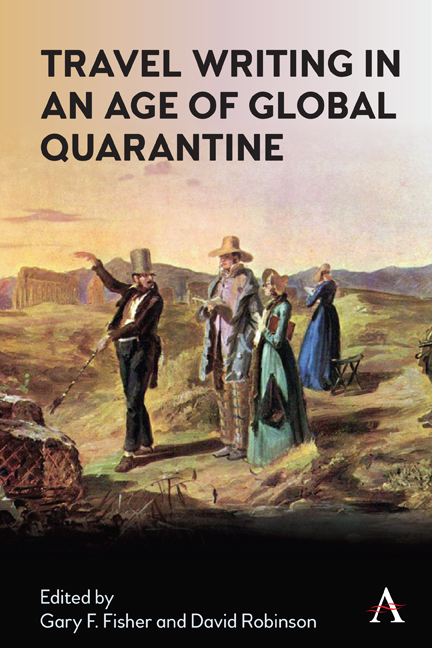Book contents
- Frontmatter
- Contents
- Foreword
- Acknowledgements
- Introduction
- Chapter One ‘Off-Stage, A War’: Wuhan, 1938
- Chapter Two Frederic Lees in Varese Ligure, 1911
- Chapter Three ‘A Rude People Subjected to No Restraint’: In Tanimbar with Anna Keith Forbes, Henry Forbes and So’u Melatunan
- Chapter Four Sent to Coventry: A Journey Home?
- Chapter Five Bedouin Is a Place: Freya Stark’s Travel with Nomads
- Chapter Six With Wilkie in the West: Reading Wilkie Collins’s Rambles beyond Railways from a Cornish Perspective
- Chapter Seven Picturing Rome: Walking the Eternal City with the Last Victorian
- Chapter Eight Su e zo per i ponti; or, How History Does Not Help
- Chapter Nine A Town Called Entropy: Boom and Bust in Arnold Bennett’s Potteries
- Chapter Ten Travelling towards Transculturalism? Statues, Remembrance and Mourning in Bloemfontein, South Africa
- Chapter Eleven Recollections of the King’s House
- Chapter Twelve Occupying Her Time: Ginette Eboué, France, 1940–42
- Epilogue
- List of Contributors
- Works Cited
Chapter Four - Sent to Coventry: A Journey Home?
Published online by Cambridge University Press: 18 November 2021
- Frontmatter
- Contents
- Foreword
- Acknowledgements
- Introduction
- Chapter One ‘Off-Stage, A War’: Wuhan, 1938
- Chapter Two Frederic Lees in Varese Ligure, 1911
- Chapter Three ‘A Rude People Subjected to No Restraint’: In Tanimbar with Anna Keith Forbes, Henry Forbes and So’u Melatunan
- Chapter Four Sent to Coventry: A Journey Home?
- Chapter Five Bedouin Is a Place: Freya Stark’s Travel with Nomads
- Chapter Six With Wilkie in the West: Reading Wilkie Collins’s Rambles beyond Railways from a Cornish Perspective
- Chapter Seven Picturing Rome: Walking the Eternal City with the Last Victorian
- Chapter Eight Su e zo per i ponti; or, How History Does Not Help
- Chapter Nine A Town Called Entropy: Boom and Bust in Arnold Bennett’s Potteries
- Chapter Ten Travelling towards Transculturalism? Statues, Remembrance and Mourning in Bloemfontein, South Africa
- Chapter Eleven Recollections of the King’s House
- Chapter Twelve Occupying Her Time: Ginette Eboué, France, 1940–42
- Epilogue
- List of Contributors
- Works Cited
Summary
In the autumn of 1933, author, playwright and social commentator John Boynton Priestley began a journey through England. His travels took him to the ‘ancient metropolis’ of Bristol and the ‘smouldering carpet’ of the Black Country, from the ‘Lilliputian’ bleakness of Stoke-on-Trent to the ‘Dickensian atmosphere’ of Norwich. Priestley's account was jointly published by Heinemann and Gollancz a year later in 1934. Titled English Journey, the book's subtitle promised the reader ‘a rambling but truthful account of what one man saw and heard and felt and thought during a journey through England during the Autumn of the year 1933’. Although he deployed a populist image to great effect, Priestley was not just ‘one man’. While he was scorned by the modernist Bloomsbury set as the ultimate ‘middlebrow’, responsible for the cultural fragmentation and decline associated with commercialisation and democratisation, by 1933 Priestley was one of the nation's most popular journalists and novelists. His novel The Good Companions, published in 1929, made him famous overnight and had already been reprinted 16 times just a year later. English Journey was a follow-up to this success and was Priestley's first ostensibly nonfiction book. It immediately rose to the top of the Bookseller's bestseller list and, by 1956, had sold 96,000 copies in hardback, making it his most successful book in that format between Angel Pavement in 1930 and Bright Day in 1946. This success was predicated on the very populist traits that the likes of Virginia Woolf, Graham Greene and even George Orwell railed against. Priestley's cultural authority ensured English Journey's often radical national portrait was immensely influential.
Priestley's more-than-400-page portrait, therefore, deserves pride of place in the large historical gallery showcasing accounts by public intellectuals and social commentators who have used the process of travel to convey to readers something fundamental about the nation in which they lived. Alongside English Journey could stand Daniel Defoe's A Tour thro’ the Whole Island of Great Britain, published in three volumes between 1724 and 1727; H. V. Morton's In Search of England from 1927; or John Higgs's more recent Watling Street: Travels through Britain and Its Ever Present Past. Yet, in its style and ideological purpose, English Journey is a book born from the radical 1930s.
- Type
- Chapter
- Information
- Travel Writing in an Age of Global Quarantine , pp. 51 - 64Publisher: Anthem PressPrint publication year: 2021



